Serving 611 students in grades 9-12, Bow High School ranks in the top 30% of all schools in New Hampshire for overall test scores (math proficiency is top 50%, and reading proficiency is top 50%).
The percentage of students achieving proficiency in math is 40-44% (which is approximately equal to the New Hampshire state average of 40%). The percentage of students achieving proficiency in reading/language arts is 65-69% (which is higher than the New Hampshire state average of 51%).
The student:teacher ratio of 13:1 is higher than the New Hampshire state level of 11:1.
Minority enrollment is 9% of the student body (majority Hispanic and Asian), which is lower than the New Hampshire state average of 18% (majority Hispanic).
Quick Stats (2025)
- Grades: 9-12
- Enrollment: 611 students
- Student:Teacher Ratio: 13:1
- Minority Enrollment: 9%
- Graduation Rate: 90-94% (Top 20% in NH)
- Overall Testing Rank: Top 30%
- Math Proficiency: 40-44% (Top 50%)
- Reading Proficiency: 65-69% (Top 20%)
- Science Proficiency: 40-44% (Top 50%)
- Source: National Center for Education Statistics (NCES), NH Dept. of Education
Top Rankings
Bow High School ranks among the top 20% of public schools in New Hampshire for:
Category
Attribute
Reading/Language Arts Proficiency
Graduation Rate
School Overview
Bow High School's student population of 611 students has declined by 6% over five school years.
The teacher population of 48 teachers has stayed relatively flat over five school years.
Grades Offered
Grades 9-12
Total Students
611 students
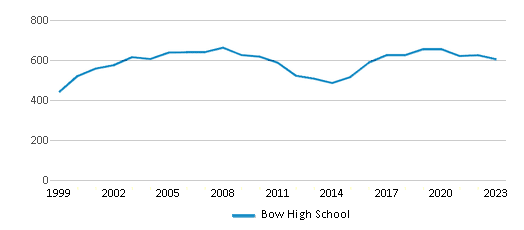
Gender %
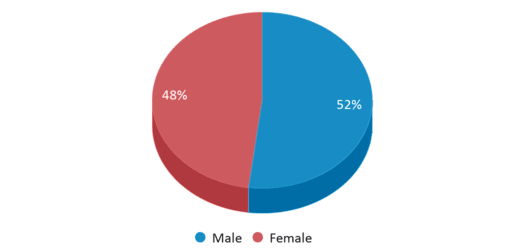
Total Classroom Teachers
48 teachers
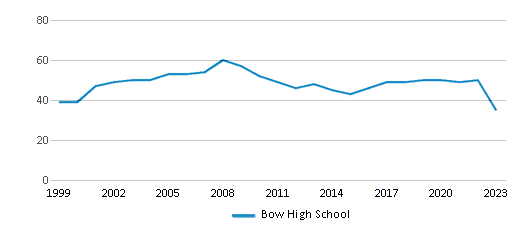
Students by Grade
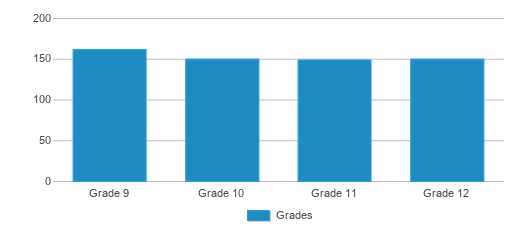
School Rankings
Bow High School ranks within the top 30% of all 457 schools in New Hampshire (based off of combined math and reading proficiency testing data).
The diversity score of Bow High School is 0.17, which is less than the diversity score at state average of 0.32. The school's diversity has stayed relatively flat over five school years.
Overall Testing Rank
#130 out of 457 schools
(Top 30%)
(Top 30%)
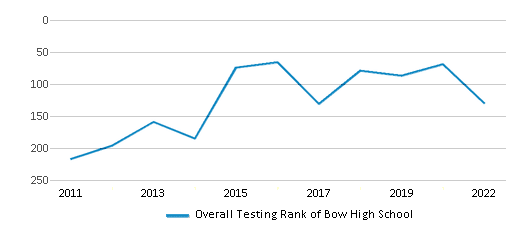
Math Test Scores (% Proficient)
40-44%
40%
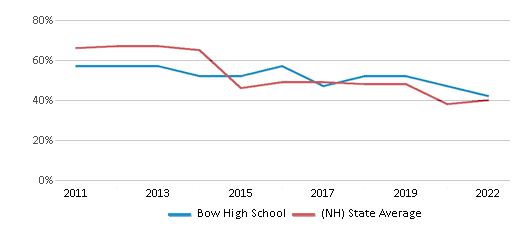
Reading/Language Arts Test Scores (% Proficient)
65-69%
51%
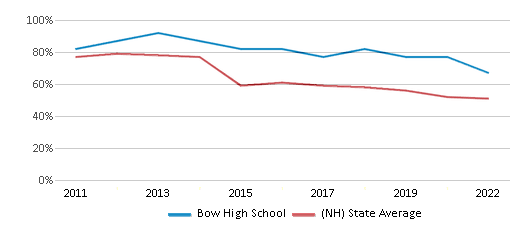
Science Test Scores (% Proficient)
40-44%
36%
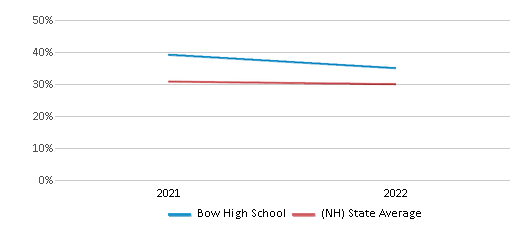
Student : Teacher Ratio
13:1
11:1
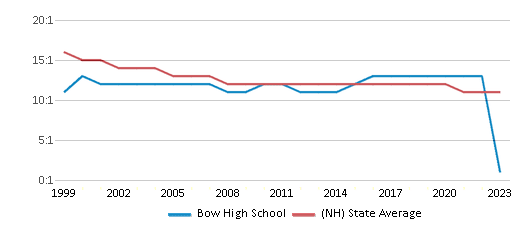
American Indian
n/a
n/a
Asian
2%
3%
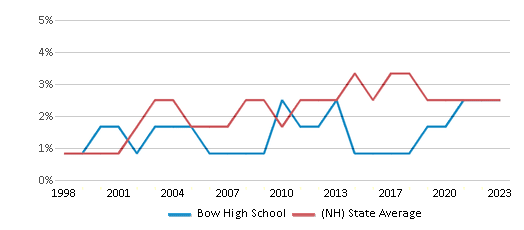
Hispanic
3%
8%
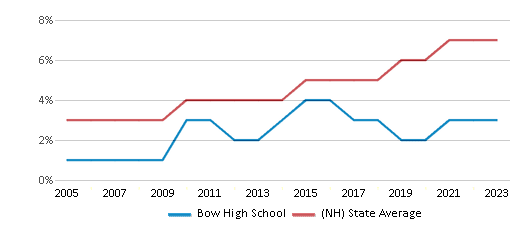
Black
1%
2%
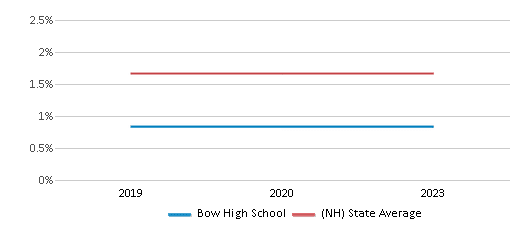
White
91%
82%
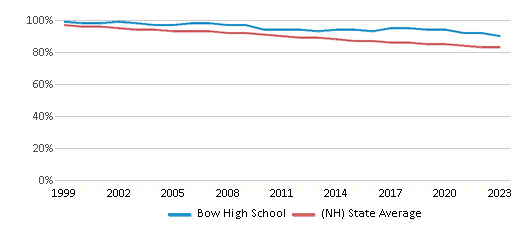
Hawaiian
n/a
n/a
Two or more races
3%
5%
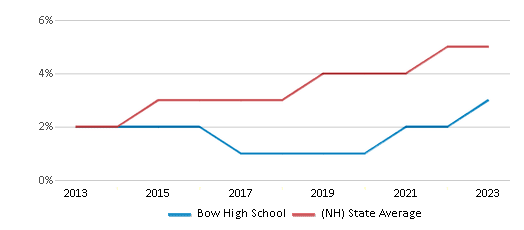
All Ethnic Groups
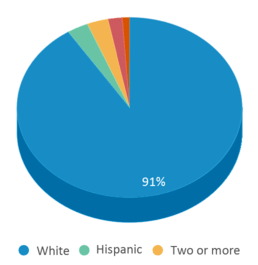
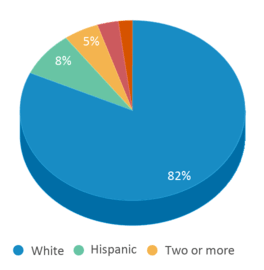
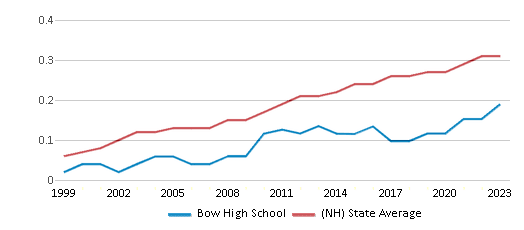
Graduation Rate
90-94%
88%
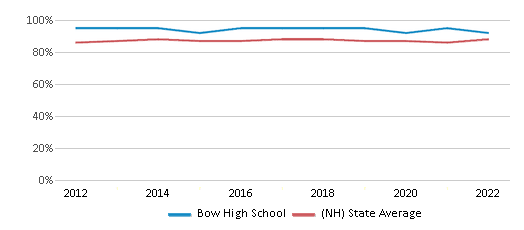
Participates in the National School Lunch Program (NSLP)
Yes
Eligible for Free Lunch
5%
20%
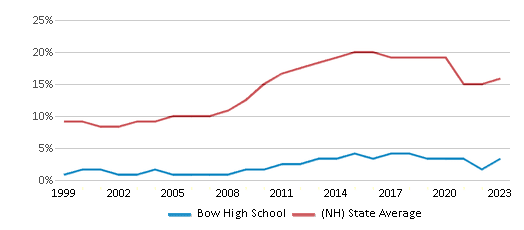
Eligible for Reduced Lunch
1%
4%
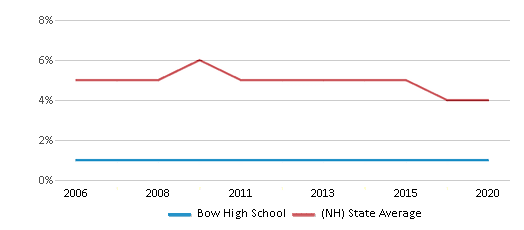
School District Name
Source: National Center for Education Statistics (NCES), NH Dept. of Education
Profile last updated: 02/09/2025
Frequently Asked Questions
What is Bow High School's ranking?
Bow High School is ranked #130 out of 457 schools, which ranks it among the top 30% of public schools in New Hampshire.
What schools are Bow High School often compared to?
Bow High Schoolis often viewed alongside schools like Hopkinton High School by visitors of our site.
What percent of students have achieved state testing proficiency in math and reading?
40-44% of students have achieved math proficiency (compared to the 40% NH state average), while 65-69% of students have achieved reading proficiency (compared to the 51% NH state average).
What is the graduation rate of Bow High School?
The graduation rate of Bow High School is 90-94%, which is higher than the New Hampshire state average of 88%.
How many students attend Bow High School?
611 students attend Bow High School.
What is the racial composition of the student body?
91% of Bow High School students are White, 3% of students are Hispanic, 3% of students are Two or more races, 2% of students are Asian, and 1% of students are Black.
What is the student:teacher ratio of Bow High School?
Bow High School has a student ration of 13:1, which is higher than the New Hampshire state average of 11:1.
What grades does Bow High School offer ?
Bow High School offers enrollment in grades 9-12
What school district is Bow High School part of?
Bow High School is part of Bow School District.
School Reviews
4 4/29/2022
My parents moved us to Bow specifically for its school system. The town definitely puts a lot of money into its education and I absolutely loved high school. There were so many opportunities for experiences and some of my favorite teachers I've ever had. I also loved picking my extra classes. It was always hard to choose what I wanted to try out of all the good options. I still miss the art room some days.
2 4/14/2016
I went here before moving out of state, and let me tell you this is the worst school you could send your child through. Between teachers only caring about numbers and test scores, and the rediculous amount of work they assign students, my sister developed anxiety and depression, my good friend has had to go to therapy, and I myself have struggled with depression and self harm because of school stress. The guidance staff is rude, and not encouraging towards students. I would not ever send my child here because I believe students should not be in a comfortable environment without the workload of a college student, and having a life rather than dedicating all of my time to school work.
Review Bow High School. Reviews should be a few sentences in length. Please include any comments on:
- Quality of academic programs, teachers, and facilities
- Availability of music, art, sports and other extracurricular activities
Recent Articles

What Is A Charter School?
Explore the world of charter schools in this comprehensive guide. Learn about their history, how they operate, and the pros and cons of this educational innovation. Discover key facts about charter schools, including admission policies, demographics, and funding, as well as what to look for when considering a charter school for your child.

10 Reasons Why High School Sports Benefit Students
Discover the 10 compelling reasons why high school sports are beneficial for students. This comprehensive article explores how athletics enhance academic performance, foster personal growth, and develop crucial life skills. From improved fitness and time management to leadership development and community representation, learn why participating in high school sports can be a game-changer for students' overall success and well-being.

February 05, 2025
Understanding the U.S. Department of Education: Structure, Impact, and EvolutionWe explore how the Department of Education shapes American education, from its cabinet-level leadership to its impact on millions of students, written for general audiences seeking clarity on this vital institution.









